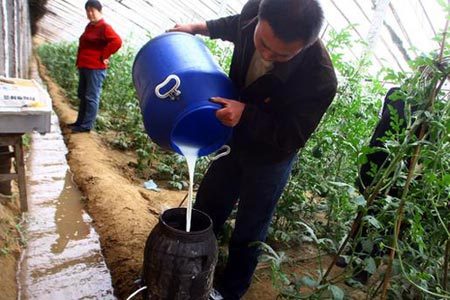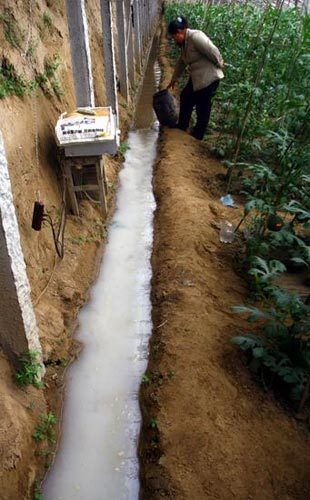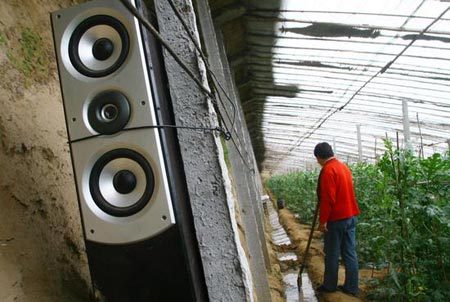Ever think about eating a cool, refreshing slice of sweet watermelon with the delicious flavor of milk on a hot summer day?
Beijingers will be able to get their fill when milk-treated watermelons hit local markets in early summer, according to a report in the Beijing Morning Post.

A watermelon grower uses fresh milk to irrigate his fruit in Panggezhaung village on the outskirts of Beijing in this recently taken photo. [Photo: Beijing Morning Post]
Wang Hanliang, dubbed the "Melon King" of Panggezhuang village in the Daxing district of Beijing, has discovered a new way to grow watermelons by irrigating them with fresh milk and playing the music of Beethoven, the report said.
He told the newspaper he was inspired last year by a television program about a fruit grower who irrigated his strawberry patch with milk for a higher strawberry yield. Wang set aside one patch of his watermelon field to experiment and used only milk instead of fertilizer.
Wang's efforts paid off when he unexpectedly won the top prize in his village's watermelon competition. His milk-treated watermelons won, because they tasted much sweeter than the other entries, the report said. Afterwards, he decided to invest 30,000 yuan (US$4,282) to irrigate his remaining 30-odd melon patches with milk.
Wang buys fresh milk at four yuan per kilogram from a neighboring cow-breeding farm. He bought 200 kilograms on April 10 and poured them into the irrigation canals to nourish the melons. Wang said it was the third time this season that he had irrigated his watermelon patches, and would be the last time before the harvest, according to the report.
Besides the milk treatment, Wang played Beethoven's sonatas in the greenhouses that cover the watermelon patches, just as mothers-to-be listen to classical music before their babies are born. As a veteran grower, Wang believes that watermelons have lives and that listening to music makes them grow faster and better than ones that are not exposed to classical tunes, the report said.
The watermelons inside Wang's greenhouses have grown to the size of about two fists. Each one has a "Milk Watermelon" trademark. Wang told the newspaper that he registered the trademark recently, worrying that other people might try to cash in on his discovery.
A researcher from the Chinese Academy of Agricultural Sciences said when milk is used in irrigation canals as a natural kind of fertilizer it can enhance the taste of fruit and reduce the adverse impact that chemical fertilizers would have on the environment. He also said milk irrigation and music are two physical agricultural technologies that are quite popular nowadays.
Wang told the newspaper that the first batch of milk-treated watermelons would be available in local markets for about 20 yuan per kilogram starting in early May.

Milk flows through irrigation canals on its way to watermelon patches. A watermelon grower in Panggezhaung village on the outskirts of Beijing has started irrigating his watermelon patches with milk to enhance the fruit's taste. [Photo: Beijing Morning Post]

A stereo plays classical music to help milk-treated watermelon grow faster in Panggezhaung village on the outskirts of Beijing. [Photo: Beijing Morning Post]
(CRI April 14, 2008)